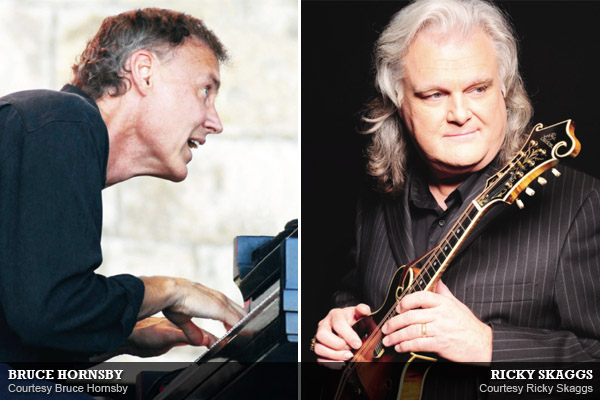
Bruce Hornsby
“To me,” Bruce Hornsby says, “it’s always been about staying inspired, broadening my reach and moving into new areas.” Born November 23, 1954 into a musical family in Williamsburg, Virginia, Hornsby, after graduating from college in 1977, headed to Los Angeles with his younger brother and then-songwriting partner, John, in 1980. Five years later, his newly-formed band, Bruce Hornsby and the Range, had a record deal.
Smash success came quickly when the titular song from the band’s 1986 debut, The Way It Is, sailed to Number One, took ASCAP’s Song of the Year award and helped its parent album go multi-platinum. After taking the Grammy for Best New Artist, the Range quickly released their follow-up, Scenes From The Southside. Hornsby then hooked up with the Grateful Dead, playing over 100 shows with the band; today, Hornsby is writing with Grateful Dead lyricist Robert Hunter.
Whether with the Dead, Bob Dylan or Eric Clapton, Hornsby has long been one of music’s most sought-after collaborators. While continuing with the Range through 1990 then releasing his solo debut in 1993, Hornsby has always fulfilled his philosophy of musical diversification. Building off prior collaborations with Wayne Shorter and Charlie Haden, 1993’s Harbor Lights and 1995’s Hot House explored jazz and bluegrass. Working with a new band, the Noisemakers, Hornsby experimented with electronica on 2002’s Big Swing Face. The Noisemakers have since released three more albums, most recently 2011’s Bride Of The Noisemakers. Over the years, he has garnered three Grammys.
Hornsby has continued to pursue his diverse interests, simultaneously recording 2007’s Camp Meeting, and a highly successful bluegrass collaboration with Ricky Skaggs. Venturing into fi lm scores and Broadway, Hornsby’s ever-widening evolution knows no bounds. He’s recently partnered with the University of Miami to design the Creative American Music Program, which brings his philosophy of immersion in diverse American musical traditions to future generations of songwriters.
Ricky Skaggs
Born on July 18, 1954 in Cordell, Kentucky, Richard Lee “Ricky” Skaggs was a prodigy. Just two weeks after he received his first mandolin at the age of five, Skaggs was making chord changes and singing along. By the end of the year, Skaggs had played with Bill Monroe to a cheering audience. By seven, “Little Ricky Skaggs” had debuted at the Grand Ole Opry and made his television premiere playing with bluegrass legends Flatt & Scruggs on their show.
As a teen, Skaggs played with Ralph Stanley’s bluegrass band for three years before moving on to play with the Country Gentlemen, J.D. Crowe & the New South and his own band, Boone Creek. In 1977, Skaggs took over for Rodney Crowell in Emmylou Harris’ Hot Band. 1980’s Roses in the Snow had Skaggs showcasing his versatility, as he wrote the arrangements, sang harmony and played mandolin and fiddle.
Skaggs shined as a band member and as an individual artist, releasing Waitin’ for the Sun to Shine in 1981 to great acclaim; he ruled the country charts for most of the 1980s, racking up 12 Number One hits. The following year, he was inducted into the Grand Ole Opry (the youngest to be inducted at the time) and began collecting awards, including multiple Country Music Association awards like Male Vocalist of the Year (1982) and Entertainer of the Year (1985), several Grammys and more, all of which contributed to his reputation as the man who was, according to Chet Atkins, “single-handedly saving country music.”
In 1997, Skaggs started Skaggs Family Records, which released an impressive 12 consecutive Grammy-nominated songs. Skaggs’ first release on his label, Bluegrass Rules!, won him his sixth Grammy Award as well as the International Bluegrass Music Association’s Album of the Year Award, and another Grammy in 1999 and 2000.
Skaggs kicked up the bluegrass again in the 2000s, earning himself several more Grammy nominations. Skaggs’ work with Kentucky Thunder on 2003’s Live at the Charleston Music Hall resulted in an IBMA Award for Instrumental Group of the Year, an honor Skaggs and Kentucky Thunder have received eight times. Since then, Skaggs, both on his own and with Kentucky Thunder, has collected a number of other Grammys and IBMA awards while steadily releasing albums through Skaggs Family, including 2010’s Mosaic. After 53 years, Skaggs continues to influence country and bluegrass like no one else.
![]()
What are you listening to right now?
Bruce Hornsby: I play a lot of solo piano concerts, and I mostly drive to them, so there’s a lot of time in the car to ruminate and turn yourself on to interesting and strange, weird music or beautiful music. I’ll try to picture the passenger seat of my car, which is filled with CDs. The piano music of Elliott Carter as played by the great classical virtuoso Ursula Oppens. The Ligeti études, some of the great pieces of the 20th century. Going over to a completely different area, the Wailin’ Jennys. They use very interesting voicings, and it moves me.
Ricky Skaggs: I have a vast array of music, everything from Flatt & Scruggs, Bill Monroe, Stanley Brothers, George Jones, Bob Wills…I love the old stuff.
I was just listening to Music to My Ears, my new record, to get some words for it. The iPod phenomenon has made my life so much easier. You can have 10,000 records right in your back pocket or wherever you wanna carry it. The problem is it sounds a little bit different. When I fly, I’ll listen to stuff I haven’t listened to in a long time.
Lately, I’ve been listening to the Bee Gees because of my relationship with Barry Gibb from the new record, so I’ve been listening to a body of work that really was fantastic. You go back to listen to that stuff long before “Stayin’ Alive” and Saturday Night Fever, and realize how incredibly great they were. Long before people were tuning vocals with Pro Tools and stuff like that, these dudes did it on the fly. They worked on it until they got it right.
What was the first record you ever bought?
BH: I was maybe eight years old. The first concert I ever saw was at the football stadium of William & Mary, in my hometown in Williamsburg, Virginia—I saw Peter, Paul and Mary. I bought their current record the next day at Schmidt’s Flowers (and record shop) in town. It wasn’t one with hits on it, but it was a great record. It was a watershed time for me: I saw Peter, Paul and Mary, bought my first record, and took piano lessons.
RS: The first record I ever bought with my own money, I was about 16. There were old 78s that had been dumped down onto an LP, the Stanley Brothers’ earliest recordings from 1947-49. It was just so incredible to hear their early sound. They were just boys, maybe 20 years old, highly influenced by Bill Monroe, which we all were. They had a mandolin player named Pee Wee Lambert with this really, really high singing voice. Pee Wee took his voice up a whole octave above the normal baritone that would’ve been under Carter Stanley’s lead and made this really high singing sound that, at that time, no one had ever done in bluegrass. We know it in bluegrass now as the “high lonesome” sound.
Where do you buy your music?
BH: I order them online, but sometimes I go into the record store to buy them. There are some great independent record stores in larger population centers, but certainly not in my town, there’s just Barnes & Noble, so sometimes I buy records there.
RS: Probably 90% of my music, I get on iTunes. When I can, I love buying hard copies of CDs because you get the credits and who sang what on everything. If there’s a CD that I really really want, then I’ll go on Amazon. The brick and mortars carry three or four genres like new country or new rap, and that’s about it, they don’t carry real deep catalogs.
What was the first instrument you played?
BH: Piano. I really didn’t start in earnest until I was 17, but I did take piano for about a year, age seven and eight. I took piano lessons in this funeral home, upstairs in this foreboding house, and I was walking by caskets, which was not something that really made you want to go back, so I stopped that. But I took lessons for about a year.
At age 12 playing guitar, just like so many other kids who saw the Beatles on Ed Sullivan. My older brother was really a good musician, so I kind of followed in his footsteps and took up the guitar and played that. I had a little band and we won the Battle of the Bands in sixth grade, mostly because I got to use my older brother’s equipment, these great Fender Bassman and Dual Showman amplifiers, and the band we were up against had these little Lafayette speakers from Radio Shack. We were way louder, so that’s probably why we won. I was more of a jock; then music was a hobby.
RS: A mandolin. My dad bought me a little pawn shop mandolin when I was five years old, and left it in my bed at five o’clock in the morning when he came in from work.
What brought you to the instrument you now play?
BH: Junior year of high school, my older brother turned me on to Joe Cocker’s Mad Dogs & Englishmen, with that great Leon Russell and Chris Stainton piano playing, and Elton John’s Tumbleweed Connection
It totally got me inspired to play the piano—that and the fact that we had a six-foot Steinway Grand in our house. My mom’s dad was a musician.
RS: I think musicians want to learn more. Stéphane Grappelli was a big, big influence on me and he was a great piano player besides being a great violinist and jazz swing player. Django Reinhardt started out playing tenor banjo until he got burned; as bad as that was, it probably was the greatest thing musically for all of us that loved his music and his style of playing. He was limited only by his imagination, and influenced hundreds of thousands of guitar players.
There’s a lot of musicians that, like myself, play mandolin, fiddle, banjo, guitar. A couple of guys in my band play three or four instruments, and they play them very very well.
There’s some piano players or violinists, they are just so dedicated to that one instrument; you’ve never heard of Jascha Heifetz ever playing banjo or piano. You may find a Jerry Douglas, or a Chris Thile and Jeff Beck that is just a master of his instrument; they just don’t play a lot of other instruments.
Who would you like to write with that you haven’t?
BH: I’ve never been much of a collaborator, although I’ve collaborated lots of times and I’ve really enjoyed it. I’m collaborating a bit now with Robert Hunter, the Grateful Dead lyricist. I love writing with Hunter and with my old childhood friend from kindergarten, Chip deMatteo.
RS: I’d love to write something with my wife. I write more instrumentals than lyrics. I just co-wrote a song on my new record, Music to My Ears, called “You Can’t Hurt Ham,” and it’s a story of Bill Monroe and the durability of cured pork.
What was the song or event that made you realize you wanted to be in music?
BH: When I started playing piano at age 17, I got so involved and just inspired, devouring great music. I’ve never stopped, and that was 40 years ago. I didn’t come out and say to my parents or my friends, “Hey, I wanna be a musician,” ’cause I just figured they would laugh at me, and rightly so.
I went to one year of what I would call normal college, the University of Richmond. It was—I wouldn’t say a miserable year, it was a bad fit—I realized I needed to go ahead and say this and do this, and so I did. It definitely inspired some protest from my parents, and I understood that. I had been very intense about basketball, too, and had just sort of gone, “OK, I’m done with this.” I did go to Berklee College of Music for two semesters after Richmond and then never looked back. I ended up going to the University of Miami where I had a great teacher, Vince Maggio, who was very tough on me. I still consider him to be my teacher even now.
RS: When I was six years old, we saw Bill Monroe live. Some of the neighbors had seen me singing at the church and the grocery store and different places like that, and they started shouting out, “Let Little Richie Skaggs get up and sing.” I think Monroe was getting ready to put an end to it, but he invited me up. He probably thought I was more like a teenager, and his heart must have stopped when he saw a six-year-old come walking to the front of the stage. He picked me up and put me on stage, and took his mandolin off, which was the size of a guitar for me. So anyway I played “Ruby,” an Osborne Brothers song that was sort of a hit at the time. The band knew it, thank God.
That was the event, it really was. As much as I had played in church, they didn’t clap. They get up and roar and clap at churches that we go to now, but at the Free Will Baptist Church, it would have been very irreverent. My dad wasn’t playing with me that night, it was just me on stage with a big band. That event made me think, “This feels so right. This is what I’m supposed to do the rest of my life.”
Who would you like in your rock ‘n’ roll heaven band?
BH: The drummer in my band, Sonny Emory. Carter Beauford from the Dave Matthews Band is a great drummer. I love Jack DeJohnette; we made a jazz record together with Christian McBride. Dead guys too? Well, I like a lot of guys who are alive. Guitar…so many people…Pat Metheny is one of my favorites; Mark Knopfler is fantastic. Hell, I play with Ricky Skaggs a lot; we made a record together and we’ve got a live record coming out next year, Skaggs & Hornsby. Cody Kilby, the flatpicker who plays with Ricky. Chris Thile would probably be the main guy. He’s a mandolin player; he won the MacArthur Grant. Chris plays with us now and then, and there’s just this real bond, a real connection. On vocals, Aretha Franklin and Bonnie Raitt. I would play piano. Why would I have a band if I couldn’t play?
RS: I would love to just stand in the middle of that original bluegrass band with Lester Flatt on guitar, Earl Scruggs on banjo, Chubby Wise on fiddle and Howard Watts on the bass. I’d love to play Mr. Monroe’s part, playing mandolin, to feel what that groove felt like. I would love to have stood in Django Reinhardt’s band and played with Stéphane Grappelli and Louis Vola, a great bass player.
It would’ve been great to be in Duke Ellington’s band, or a fifth wheel in the Beatles, to just have felt what they were playing. The shouts and the craziness that was going on on-stage and going on in the audience, it changed rock music forever because they didn’t create sound systems in those days that could handle the crowds they were drawing; they were absolutely pioneers in all they were doing. I would have loved to have put my foot in there and stood around those great players.
What’s your desert island CD?
BH: It wouldn’t be a CD, it would have to be a massive box set. Bob Dylan’s Biograph. The complete Elliott Carter—and I don’t even know if there is one—or Sun Bear Concerts [Keith Jarrett]—a six-CD set.
RS: I don’t wanna sound conceited, but I recorded a CD about four years ago called Mosaic, and for lack of a better term, it has Christian gospel lyrics written by Gordon Kennedy and Ben Cooper. Gordon co-wrote “Change the World” with Eric Clapton. Those songs are so life-giving and so encouraging, if I only had one CD, that would probably be what I would live with because of the lyrics and the truth that’s in it.


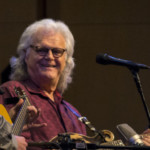
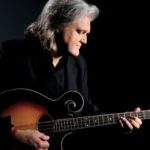
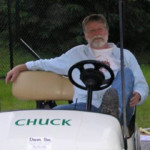
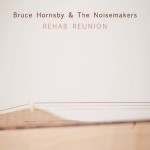

Be the first to comment!